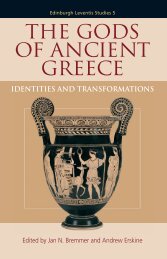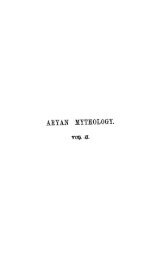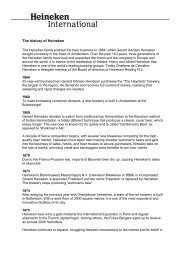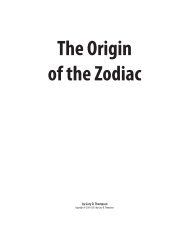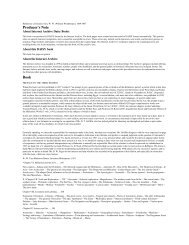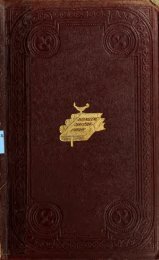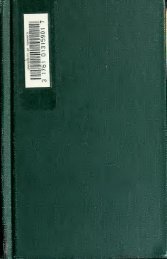- Page 1 and 2: ?Vv'S?.'i;?^'*vif';i*?;'
- Page 3 and 4: 3 1924 082 458 781
- Page 5 and 6: THE ILIAD OF HOMER FAITHFULLY TRANS
- Page 7 and 8: PREFACE. If such a people as the an
- Page 9 and 10: PREFACE. V phrase can hardly be too
- Page 11 and 12: PREFACE. vii the line must not be c
- Page 13 and 14: PREFACE. ix to render the original
- Page 15: PREIACE. xi thankful ; and readers
- Page 19 and 20: PEEPACE. XV reek Athene, but the pa
- Page 21 and 22: PREFACE. xvii hand, would he try to
- Page 23 and 24: PREFACE. six namCj Danai is also us
- Page 25 and 26: GLOSSARY. Some readers may not be s
- Page 27 and 28: CONTENTS. BOOK PAGE I. THE QUAEREL
- Page 29 and 30: THE ILIAD BOOK I. \j¥ Peleus' son,
- Page 31 and 32: ; BOOK I.] THE ILIAD. 3 If war at o
- Page 33 and 34: BOOK I.] THE ILIAD. 5. To him in wo
- Page 35 and 36: BOOK I.] THE ILIAD. 7 Then duly he
- Page 37 and 38: Wok I.] THE ILIAB. , And they to my
- Page 39 and 40: ' BOOK I.] THE ILIAD. 11 Nor knowet
- Page 41 and 42: BOOK I.] THE ILIAD. 13 And widely -
- Page 43 and 44: BOOK 1.] THE ILIAD. 15 Eight square
- Page 45 and 46: BOOK I.] THE ILIAD. 17 To him respo
- Page 47 and 48: 19 BOOK II. t JN ow all beside, bot
- Page 49 and 50: ; : ; : BOOK II.] THE ILIAD. 21 O'e
- Page 51 and 52: ii» iii. ; ; ! ; : : BOOK II.] THE
- Page 53 and 54: BOOK II.] THE ILIAD. 35 Who are thy
- Page 55 and 56: BOOK II.] THE ILIAD. 27 Tortur'd wi
- Page 57 and 58: BOOK II.] THE ILIAD. 39 Whither are
- Page 59 and 60: BOOK 11.] THE ILIAD. 31 tJlyases wa
- Page 61 and 62: BOOK II.] THE ILIAD. 33 Stood forth
- Page 63 and 64: BOOK II.] THE ILIAD. 35 Calchodon's
- Page 65 and 66: BOOK II.] THE ILIAD. 37 Men of Arca
- Page 67 and 68:
BOOK II.] THE ILIAD. 39 Two sons of
- Page 69 and 70:
BOOK 11.] THE ILIAD. 41 Of these th
- Page 71 and 72:
; : ; BOOK ii.J THE ILIAD. 43 Which
- Page 73 and 74:
BOOK III.] THE ILIAD. 45 Both Naste
- Page 75 and 76:
BOOK III.] THE ILIAD. 47 Must needs
- Page 77 and 78:
BOOK III.] THE ILIAD. 49 Forward di
- Page 79 and 80:
BOOK III.] THE ILIAD. 51 When Amazo
- Page 81 and 82:
BOOK. III.] THE ILIAD. 53 Then on t
- Page 83 and 84:
BOOK III.] THE ILIAD. 55 About his
- Page 85 and 86:
tiooK in.] I -^ ' THE ILIAD. Go the
- Page 87 and 88:
59 BOOK IV. JN ow by the side of Jo
- Page 89 and 90:
300K IV.] THE ILIAD. 61 Begin with
- Page 91 and 92:
JOOK IV.] THE ILIAD. 63 rhe baldric
- Page 93 and 94:
BOOK IV.] THE ILIAD. 65 So they, re
- Page 95 and 96:
BOOK IV.] THE ILIAD. 67 Mov'd onwar
- Page 97 and 98:
BOOK IV.] THE ILIAD. 69 Then shalt
- Page 99 and 100:
BOOK IV.] THE ILIAB. 71 With screec
- Page 101 and 102:
BOOK IV.] , THE ILIAD. 73 The galla
- Page 103 and 104:
BOOK v.] THE ILIAD. 75 Nor dar'd to
- Page 105 and 106:
BOOK Y.] THE ILIAD. 77 Piercing the
- Page 107 and 108:
: ; BOOK v.] THE ILIAD. 79 Nor any,
- Page 109 and 110:
; BOOK T.] THE ILIAD. 81 No measure
- Page 111 and 112:
BOOK v.] THE ILIAD. 83 Lest from th
- Page 113 and 114:
BOOK v.] THE ILIAD, 85 Outworn alre
- Page 115 and 116:
BOOK v.] THE ILIAD. 87 And then upo
- Page 117 and 118:
BOOK v.] THE ILIAD. 89 Of bashful-h
- Page 119 and 120:
BOOK v.] THE ILIAD. '91 He spake: m
- Page 121 and 122:
BOOK v.] THE ILIAD. 93 He thro' the
- Page 123 and 124:
BOOK v.] THE ILIAD. 95 There Juno w
- Page 125 and 126:
BOOK T.] THE ILIAD. 97 Neither do t
- Page 127 and 128:
BOOK VI.] THE ILIAD. 99 Thereat did
- Page 129 and 130:
; BOOK VI.] THE ILIAD. 101 '" O Men
- Page 131 and 132:
BOOK VI.] THE ILIAD. 103 Along the
- Page 133 and 134:
BOOK VI.] THE ILIAD. 105 Who bare t
- Page 135 and 136:
BOOK Ti.] THE ILIAD. 107 To Jupiter
- Page 137 and 138:
BOOK vr.] THE ILIAD. , 109 But now
- Page 139 and 140:
BOOK Ti.] THE ILIAD. Jll The father
- Page 141 and 142:
BOOK VI.] THE ILIAD. 113 And rais'd
- Page 143 and 144:
BOOK vii.] THE ILIAD. 115 Son of Ar
- Page 145 and 146:
; ! ; BOOK vii.] THE ILIAD. 117 But
- Page 147 and 148:
BOOK VII.] THE ILIAD. 119 In this,
- Page 149 and 150:
BOOK vii.] THE ILIAD. 121 Then Ajax
- Page 151 and 152:
BOOK vii.] THE ILIAD. 123 This day
- Page 153 and 154:
' BOOK VII.] THE ILIAD. 125 But all
- Page 155 and 156:
BOOK VII.] THE ILIAD. 137 Eear'd fr
- Page 157 and 158:
BOOK viii.] THE ILIAD. 129 Where br
- Page 159 and 160:
BOOK VIII.] THE ILIAD. 131 While th
- Page 161 and 162:
' How BOOK Tin.] THE ILIAD, 133 Wit
- Page 163 and 164:
BOOK viii.] THE ILIAD. 135 While ba
- Page 165 and 166:
BOOK vni:] THE ILIAD. 137 The spotl
- Page 167 and 168:
BOOK nil.] THE ILIAD. 139 That I me
- Page 169 and 170:
' Yet BOOK Tin.] THE ILIAD. 141 " J
- Page 171 and 172:
BOOK VIII.] THE ILIAD, 143 On to th
- Page 173 and 174:
Booa IX.] THE ILIAD. 145 So in full
- Page 175 and 176:
; BOOK IX.] THE ILIAD. 147 Burn man
- Page 177 and 178:
BOOK IX.] THE ILIAD. 149 The vinecl
- Page 179 and 180:
BOOK IX.] THE ILIAD, 151 Ajax to Ph
- Page 181 and 182:
BOOK IX.] THE ILIAD. 153 Who thee w
- Page 183 and 184:
BOOK IX.] THE ILIAD. 155 Alway arra
- Page 185 and 186:
BOOK IX.] THE ILIAD. 157 To sHun th
- Page 187 and 188:
BOOK IX.] THE ILIAD. 159 Before suc
- Page 189 and 190:
BOOK IX.] THE ILIAD. 161 Of captur'
- Page 191 and 192:
; BOOK ix.l THE ILIAD. 163 Lay Iphi
- Page 193 and 194:
BOOK X.] THE ILIAD. 165 But to his
- Page 195 and 196:
BOOK X.] THE ILIAD. 167 For, my sad
- Page 197 and 198:
BOOK X.] THE ILIAD. 169 " Ay, veril
- Page 199 and 200:
BOOK X.] THE ILIAD. 171 If he be my
- Page 201 and 202:
BOOK X.] THE ILIAD. 173 That .veril
- Page 203 and 204:
BOOK X.] THE ILIAD. 175 "To mighty
- Page 205 and 206:
BOOK X.] THE ILIAD. 177 But come, t
- Page 207 and 208:
BOOK X.] THE ILIAD. 179 To him in t
- Page 209 and 210:
BOOK XI.] THE ILIAD. 181 Above, he
- Page 211 and 212:
BOOK XI.] THE ILIAD. 183 Hit with h
- Page 213 and 214:
BOOK XI.] THE ILIAD. 185 But when a
- Page 215 and 216:
BOOK XI.] THE ILIAD. 187 Then Agame
- Page 217 and 218:
BOOK XI.] THE ILIAD. 189 The hero-p
- Page 219 and 220:
BOOK XI.] THE ILIAD, 191 Thereon Ul
- Page 221 and 222:
BOOK XI.] ~ THE ILIAD. 193 Around a
- Page 223 and 224:
BOOK XI.] THE ILIAD. 19S And in the
- Page 225 and 226:
BOOK XI.] THE ILIAD. 197 First goat
- Page 227 and 228:
BOOK XI.] ,THE ILIAD. 199 Sitteth u
- Page 229 and 230:
; : : ; : ; BOOK xi!} THE ILIAD. 30
- Page 231 and 232:
203 BOOK XII. X Hus valiant Menoeti
- Page 233 and 234:
BOOK XII.] THE ILIAD. 3ft5' Shall i
- Page 235 and 236:
BOOK HI.] THE ILIAD; 207 Beliant on
- Page 237 and 238:
BOOK XII.] THE ILIAD. 209 Well know
- Page 239 and 240:
BOOK XII.] THE ILIAD. 211 To mount
- Page 241 and 242:
BOOK XII.] THE ILIAD. 213 Helmet an
- Page 243 and 244:
: BOOK XIII.] THE ILIAD. 215 Mantle
- Page 245 and 246:
BOOK xiii.] THE ILIAD. 317 But here
- Page 247 and 248:
: BOOK xiii.] THE ILIAD. 219 Then s
- Page 249 and 250:
BOOK xiii.] THE ILIAD. 321 Eaising
- Page 251 and 252:
— : : — : BOOK xiii.] THE ILIAD
- Page 253 and 254:
; BOOK XIII.] THE ILIAD. 225 By Tro
- Page 255 and 256:
BOOK XIII.] THE ILIAD. 227 Nor yet
- Page 257 and 258:
BOOK XIII.] THE ILIAD. 329 When he
- Page 259 and 260:
BOOK XIII.] THE ILIAD. 231 Then bac
- Page 261 and 262:
BOOK xiii.] THE ILIAD. 233 And of s
- Page 263 and 264:
; ; : : BOOK XIII.] THE ILIAD. 235
- Page 265 and 266:
: BOOK XIII.] THE ILIAD. 237 The wa
- Page 267 and 268:
BOOK XIV.] THE ILIAD. 239 Dothouthe
- Page 269 and 270:
BOOK XIV.] THE ILIAD. 2il Arrive j
- Page 271 and 272:
BOOK xiT.] THE ILIAD. 343 Vigour im
- Page 273 and 274:
BOOK XIV.] THE ILIAD. 245 Above the
- Page 275 and 276:
BOOK XIV.] THE ILIAD. 247 Then guil
- Page 277 and 278:
BOOK XIV.] THE ILIAD. 249 Yet no to
- Page 279 and 280:
BOOK xiT.] THE ILIAD. 251 Then Ajax
- Page 281 and 282:
BOOK XV.] THE ILIAD. 253 Next Menel
- Page 283 and 284:
BOOK XT.] THE ILIAD. 255 From battl
- Page 285 and 286:
BOOKXV.l THE ILIAD. 257 Troth 1 vai
- Page 287 and 288:
BOOK IV.] THE ILIAD. 259 " Earth-en
- Page 289 and 290:
BOOK XV.] THE ILIAD. 261 By forest-
- Page 291 and 292:
BOOK XV.] THE ILIAD. 363 Whilefrom
- Page 293 and 294:
— : ; BOOK XV.] THE ILIAD. 265 An
- Page 295 and 296:
jooK XV.] THE ILIAD. 267 Loud shout
- Page 297 and 298:
BOOK XT.] THE ILIAD. 269 "Oh. frien
- Page 299 and 300:
BOOK XV.] THE ILIAD. 271 Save only
- Page 301 and 302:
: BOOK XV.] THE ILIAD. 373 Some fel
- Page 303 and 304:
BOOK XVI.] THE ILIAD. 375 cruel ! n
- Page 305 and 306:
BOOK XVI.] THE ILIAD. 277 The shini
- Page 307 and 308:
BOOK ivi.] THE ILIAD. 379 One of th
- Page 309 and 310:
BOOK XVI.] THE ILIAD. 281 Knoweth t
- Page 311 and 312:
BOOK XVI.] THE ILIAD. 383 Into the
- Page 313 and 314:
BOOK xvT.] THE ILIAD. 285 By second
- Page 315 and 316:
BOOK XVI.] THE ILIAD, 287 Again Sar
- Page 317 and 318:
BOOK XVI.] THE ILIAD. 289 Them did
- Page 319 and 320:
; ; ; BOOK XVI.] THE ILIAD. 391 Not
- Page 321 and 322:
— : ; : : BOOK XTi.] THE ILIAD. 2
- Page 323 and 324:
BOOK XVI.] THE ILIAD. 295 Out of th
- Page 325 and 326:
BOOK xvii.] THE ILIAD, 297 Mourning
- Page 327 and 328:
BOOK XVII.] THE ILIAD. 299 So with
- Page 329 and 330:
BOOK XVII.] THE ILIAD. 301 So spake
- Page 331 and 332:
BOOK xvii.l THE ILIAD. 303 To bear
- Page 333 and 334:
BOOK XVII.] THE ILIAD. 305 With suc
- Page 335 and 336:
BOOK XVII.] THE ILIAD, 307 Go we ag
- Page 337 and 338:
BOOK xvii.] THE ILIAD. 309 And thus
- Page 339 and 340:
BOOK XVII.] THE ILIi^D. 311 Amid th
- Page 341 and 342:
BOOK xvii.l THE ILIAD. Gladly would
- Page 343 and 344:
I BOOK xvii.] THE ILIAD. 315 Who, h
- Page 345 and 346:
'f So : ! : ; BOOK XVII.] THE ILIAD
- Page 347 and 348:
BOOK xTiii.] THE ILIAD. 319 Surely,
- Page 349 and 350:
* May BOOKXviii.] THE ILIAD. 321 Oh
- Page 351 and 352:
BOOK XVIII.] THE ILIAD. 323 A fiery
- Page 353 and 354:
BOOK xvm.] THE ILIAD. 325 Then larg
- Page 355 and 356:
BOOK XVIII.] THE ILIAD. 327 But non
- Page 357 and 358:
BOOK XVIII.] THE ILIAD. 329 "But wh
- Page 359 and 360:
BOOK XVIII.] THE ILIAD. 331 Therefo
- Page 361 and 362:
BOOK xvni.] THE ILIAD. 333 And form
- Page 363 and 364:
BOOK XIX.] THE ILIAD. 335 BOOK XIX.
- Page 365 and 366:
BOOK XIX.] THE ILIAD. 837 Whether b
- Page 367 and 368:
BOOK XIX.] THE ILIAD. 339 With thee
- Page 369 and 370:
BOOK XIX.] THE ILIAD. 341 Steeling
- Page 371 and 372:
BOOK XIX.] THE ILIAD. 343 Imploring
- Page 373 and 374:
BOOK XIX.] THE ILIAD, 345 The flare
- Page 375 and 376:
BOOK XX.] THE ILIAD. 347 "Lord of t
- Page 377 and 378:
BOOK XX.] THE ILIAD. 349 For, comin
- Page 379 and 380:
BOOK XX.] THE ILIAD. 351 Some dart
- Page 381 and 382:
BOOK XX.] THE ILIAl). 353 But human
- Page 383 and 384:
BOOK xx.J THE ILIAD. 355 And came,
- Page 385 and 386:
; BOOK XX.] THE ILIAD. 357 With whe
- Page 387 and 388:
BOOK XX.] THE ILIAD. 359 Smote on t
- Page 389 and 390:
BOOK xxi.J THE ILIAD. 361 Then to t
- Page 391 and 392:
BOOK XXI.] THE ILIAD. 363 When some
- Page 393 and 394:
BOOK XXI.] THE ILIAD. 365 Beside th
- Page 395 and 396:
BOOK XXI.] THE ILIA.D. 367 Prom riv
- Page 397 and 398:
BOOK XXI.] THE ILIAD. 369 The eels
- Page 399 and 400:
BOOK,XXI.] THE ILIAD. 371 Thus oa t
- Page 401 and 402:
BOOK XXI.] THE ILIAD. 373 Jove's mi
- Page 403 and 404:
BOOK XXI.] THE ILIAD. 375 A panther
- Page 405 and 406:
BOOK xxii.] THE ILIAD. 377 So brill
- Page 407 and 408:
BOOK XXII.] THE ILIAD. 379 Or else
- Page 409 and 410:
BOOK XXII.] THE ILIAD. 881 Do it :
- Page 411 and 412:
BOOK XXII.] THE ILIAD. 383 Grant me
- Page 413 and 414:
BOOK XXII.] THE ILIAD. 385 simpleto
- Page 415 and 416:
BOOK XXII.] THE ILIAD. 387 Afar, an
- Page 417 and 418:
BOOK XXII.] THE ILIAD. 389 To whom,
- Page 419 and 420:
BOOKXxiii.] THE ILIAD. 391 In slaug
- Page 421 and 422:
BOOK XXIII.] THE ILIAD. 393 " Ye Sp
- Page 423 and 424:
BOOK xxiir.] THE ILIAD. 395 Whom he
- Page 425 and 426:
BOOK XXIII.] THE ILIAD. 397 First,
- Page 427 and 428:
BOOK xxiii.] THE ILIAD. 399 With ey
- Page 429 and 430:
BOOK xxiii.] THE ILIAD. 401 To them
- Page 431 and 432:
BOOK XXIII.] THE ILIAD. 403 Still t
- Page 433 and 434:
BOOK XXIII.] THE ILIAD. 405 " Antil
- Page 435 and 436:
BOOK xxm.] THE ILIAD. 407 To wrestl
- Page 437 and 438:
: BOOK XXIII.] THE ILIAD. 409 Uprig
- Page 439 and 440:
BOOK XXIII.] THE ILIAD. 411 " Ye Sp
- Page 441 and 442:
; BOOK XXIII.] THE ILIAD. 413 But i
- Page 443 and 444:
; BOOK XXIV.] THE ILIAD. 415 Hector
- Page 445 and 446:
BOOK XXIV.] THE ILIAD. 417 And some
- Page 447 and 448:
BOOK xxiT.] THE ILIAD. 419 For,—s
- Page 449 and 450:
. A BOOK XXIV.] THE ILIAD. 431 Alas
- Page 451 and 452:
BOOK XXIV.] THE ILIAD. 423 When thr
- Page 453 and 454:
BOOK XXIV.] THE ILIAD. 425 Por, sit
- Page 455 and 456:
BOOK XXIV.] THE ILIAD. 437 And stoo
- Page 457 and 458:
BOOK xxiT.] THE ILIAD. 429 Untended
- Page 459 and 460:
BOOK xxiT.] THE ILIAD. 431 Himself
- Page 461 and 462:
BOOK XXIV.] THE ILIAD. 433 ' Fram'd
- Page 463:
BOOK XXIV.] THE ILIAD. 435 Friendly
- Page 466 and 467:
World printed for WALTON AND MABERL
- Page 468 and 469:
Worha printed for Walton and Majber
- Page 470 and 471:
NEWMAN'S TRANSLATION OF HOMER. Crow
- Page 472 and 473:
WORKS PUBLISHED BY Smith's Flatd. T
- Page 474 and 475:
WORKS PUBLISHED BY Nlebuhr's Histor
- Page 476 and 477:
6 WORKS PUBLISHED BT '"" "*""•'"
- Page 478:
8 WORKS PUBLISHED BY WALTON AND MAB



